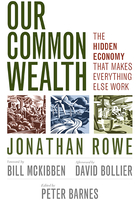
FOREWORD
by Bill McKibben
In case you think there’s anything small or secondary about the idea of the commons, in case you think it a molehill to the mountain of our economy, consider the issue that lies athwart our progress as a civilization: climate change.
One economist after another has described climate change as a “market failure,” the greatest of all time, since without a price attached to use of the atmosphere we continue to pollute it with abandon. But the solution to climate change requires us to understand that the atmosphere is a commons. If it belongs to anyone, it belongs to all of us. And if Exxon and other fossil fuel companies want to use it as a dump, they need to compensate us at a rate that leads to the rapid technological and social change on which our future depends.
Our greatest climatologist, James Hansen, the man who first alerted the world to the crisis, has led a relentless campaign for just this response, terming it “fee-and-dividend.” So it’s not too much to say that our future as a species requires grasping the ideas in this book.
Which is why it’s so good that Jon Rowe was perhaps the clearest writer I can think of. In these chapters he manages to take a concept most people have never really considered and put it in terms that no reasonable reader will reject. This is especially telling because the subset of the population that has heard of the commons has usually heard of it in negative terms.
Garrett Hardin’s famous essay, “The Tragedy of the Commons,” was, as it turned out, both seductively appealing and almost entirely wrong. As Rowe demonstrates, communities around the planet have managed to hold land and many other things in common, and to do so wisely and carefully. It’s only when those commons are invaded by a rampaging market that their protective arrangements break down. We’ve wasted a good many years following Hardin’s libertarian solutions. Now it’s time to get on a workable path.
As we do, it’s worth underlining that there’s nothing automatic about managing a successful commons. It requires us to be in contact, and to think about how we fit into the greater whole. It asks us to be more than mere consumers. And as Rowe points out again and again, we’re completely capable of doing that. This is evident not just in olden-day stories about pastures, but in up-to-the-minute tales of Wikipedia, land trusts, public radio, and farmer’s markets.
In the past year, the Occupy movement has limned the failures of our market economy. Many have complained, however, that Occupy didn’t come up with a set of solutions. In fact, the commons in its many guises is the end to which their outrage points (and even, in the self-government of the Occupy encampments, what it began to model).
THE COMMONS DOESN’T CONSTITUTE THE WHOLE answer; there are many things markets do well, as long as they’re adequately regulated. But it is the ideas in this book that point the way forward. Jon Rowe, a wise and decent man and a good friend, died much too soon. He’s not here to lead the charge, so we need to spread his insights together.
Bill McKibben is an author, climate activist, and Schumann Distinguished Scholar at Middlebury College. He has written more than a dozen books, including The End of Nature (1989) and Eaarth: Making a Life on a Tough New Planet (2010). He currently leads the climate campaigning organization 350.org.